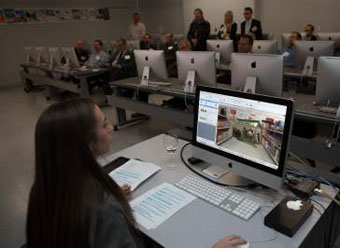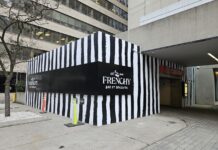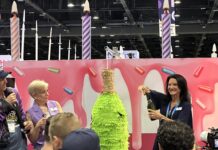 Esko and Ryerson University’s School of Graphic Communications Management (GCM) have announced that Esko has donated a significant amount of software and hardware to the school. Proclaimed on campus at a special ribbon-cutting ceremony overseen by Sheldon Levy, President and Vice Chancellor of Ryerson University, the donation will facilitate Ryerson’s work to prepare students for careers as managers in the growing and dynamic printing and packaging industry. The gift also brings the university to $128 million of its $200-million goal for the Make Your Mark Campaign.
Esko and Ryerson University’s School of Graphic Communications Management (GCM) have announced that Esko has donated a significant amount of software and hardware to the school. Proclaimed on campus at a special ribbon-cutting ceremony overseen by Sheldon Levy, President and Vice Chancellor of Ryerson University, the donation will facilitate Ryerson’s work to prepare students for careers as managers in the growing and dynamic printing and packaging industry. The gift also brings the university to $128 million of its $200-million goal for the Make Your Mark Campaign.
“Esko is very active in the Toronto packaging market, and it’s seldom that we have a customer or client who isn’t connected to Ryerson University in some way,” says Larry Moore, Esko’s director of software services in North America. “Considering this, and the fact that Ryerson’s School of Graphic Communications Management is a leader in educating those in the packaging industry, donating this gift to Ryerson was a natural choice for us.”
 The products donated to the school will give students access to cutting-edge applications for the design, visualization, proofing and production of packaging, allowing faculty and students to take on new curricular initiatives in printing and packaging. The powerful, customizable workflow software and imaging systems are used by the majority of companies in the packaging industry, giving Ryerson students direct exposure to the latest industry-specific applications. The donation will also allow faculty to expand their professional expertise, and engage in new research activities.
The products donated to the school will give students access to cutting-edge applications for the design, visualization, proofing and production of packaging, allowing faculty and students to take on new curricular initiatives in printing and packaging. The powerful, customizable workflow software and imaging systems are used by the majority of companies in the packaging industry, giving Ryerson students direct exposure to the latest industry-specific applications. The donation will also allow faculty to expand their professional expertise, and engage in new research activities.
As Canada’s only degree-granting program for future managers in the printing industries, the School of Graphic Communications Management at Ryerson recognizes the dynamic nature of technology and its relationship to the graphic communications industry, including valued partners such as Esko. “The generous support of donors such as Esko strengthens Ryerson in its continued growth as a centre of teaching and research, at the forefront of career-focused university education in Canada,” says Adam B. Kahan, Ryerson University’s Vice-President, University Advancement.
“Students in the School of Graphic Communications Management will benefit tremendously from this strengthening of our partnership with Esko,” remarks Ian Baitz, Chair of the School of Graphic Communications Management. “This major donation will allow our 500 GCM students to learn Esko’s industry-leading packaging design and prepress systems.
“We are thrilled to begin using Esko job management and automation modules, including tools such as DeskPack and ArtiosCAD. Our new Esko CDI Spark imagesetter will become a very important piece of equipment in our new prepress flexography workflow.”
GCM students, faculty, and staff are thrilled to be using the Esko applications, which have been installed and incorporated into the curriculum. The school has received a number of seats of some portions of packaging workflow software in the past.
The new, more significant gift includes the full workflow system, and enough seats for all of its lab and faculty computers. As well, the current gift is consists of fully up-to-date versions of software. Students will use the workflow for first- and third-year premedia courses that focus on packaging and layout.
 A portion of the donation was new equipment for the GCM premedia platemaking lab for flexographic platemaking. The Esko CDI Spark flexo has been installed to make plates for flexography, which will help students to learn and practice platemaking processes using the Esko workflow system. Flexography is widely used in the packaging industry and is currently experiencing market growth and quality improvements.
A portion of the donation was new equipment for the GCM premedia platemaking lab for flexographic platemaking. The Esko CDI Spark flexo has been installed to make plates for flexography, which will help students to learn and practice platemaking processes using the Esko workflow system. Flexography is widely used in the packaging industry and is currently experiencing market growth and quality improvements.
All third-year students will produce flexo plates on the new CDI. Files will undergo the workflow and quality management process, and then be individually imaged as flexo plates.
“We have focused on offset and digital printing for many years,” comments Baitz. “We added a flexo press three years ago, but our missing pieces were a packaging workflow and method to create plates. Cooperating companies in the Toronto area were kind enough to make plates for us, but we wanted students to see the workflow and platemaking process for themselves.
“Now we have access to the tools and students can evaluate their own plates for quality.”
There are also many potential areas of concentration for research. While implementation is too early to definitively determine where study may go, experimentation will include software solutions, flexo plate quality, package design—along with printability of stochastic and other specialty dot shape data.
Ryerson also intends its extracurricular clubs to put the equipment to use. RyePack, the packaging club, is heavily involved with Canadian and international packaging association contests, where the software and the CDI will be of considerable help. The club also looks forward to learn from plant tours of local Esko users.
This year’s Phoenix Challenge flexo printing entry (of which Baitz is the advisor) will benefit from the new Esko equipment. In this competition, print quality is of utmost importance. Profiling a press, the platemaking process, trapping, dot structure, gradients, and cutback curves are all important facets that can be controlled by Esko tools. RyeTAGA, an official Student Chapter of TAGA, with over sixty members, will now be able to use their Esko equipment to participate in TAGA events, including for research papers and the production of their annual TAGA student journal.
“Our students are very open to packaging and flexo printing. It speaks to our students. They are touching packaging every day,” concludes Baitz. “Packaging involves marketing, branding, and consumer decision-making processes. It is a challenging, evolving technology and the tools they use are on the cutting edge.
“We are grateful to Esko for its contribution and support, and hope that this program is a positive influence for our students, Esko, and the local industry base in the Toronto areas, as well.”











